New Haven Green
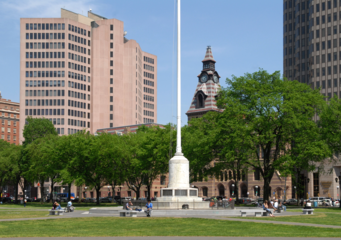
Location: 250 Temple St, New Haven, CT 06511
Description: Equal parts park and town square, the New Haven Green is the centerpiece of a nine-square street grid. Elm Street hosts one of New Haven’s dedicated bike lanes and the Green is a hub for CTTransit buses and shuttles to Union Station.
Did you know? Bicycles are accommodated on all CTTransit buses, as well as all Yale Shuttle buses.
Get involved: Log your bus trips in CTrides Commuter Rewards to earn restaurant coupons, local retailer discounts, and tickets to shows and attractions.
Cross Campus + Bass Library

Location: 1110 Wall St, New Haven, CT 06511
Description: Cross Campus and Bass library are popular student hangouts. Bass is one Yale’s libraries that contains 200,000 volumes and a coffee shop. Its grassy green roof makes up Cross Campus, a popular spot for springtime study groups and frisbee tossing.
Did you know? Green roofs eliminates stormwater runoff as precipitation is absorbed by the soil and plant life that also regulates the building’s temperature and reduces operating costs
Get involved: Visit the café in the lobby of Bass library learn more about the Library’s sustainability initiatives.
Yale Divinity Farm
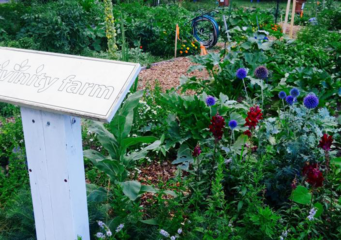
Location: 409 Prospect St, New Haven, CT 06511
Description: A community supported garden available to Yale Divinity Students
Did you know? The project is a part of the School’s effort to include the environment in the study of theology
- The farm grows sweet corn, tomatoes, peppers, scallions, carrots, lettuce, herbs, and native flowers that are often used by the Berkeley Center for community dinner following Eucharist Services.
- Food waste from Divinity Housing is picked up by Yale Grounds as part of their campus-wide composting efforts.
Get involved: Take a course in the joint degree in religion and ecology program, volunteer at the farm, read about the Divinity School’s sustainability initiatives.
Urban Meadows
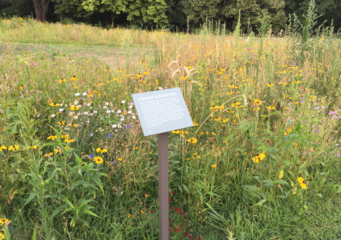
Location: Science Hill
Description: Intentional green spaces that are only mowed two to three times a year
Did you know? Yale’s urban meadows promote natural regeneration and co-benefits
- The meadows increase biodiversity, improve local air quality, beautify the area, reduce pesticide use, reduce stormwater runoff
- The meadows provide economic savings and improved local air quality from reduced mowing
Get involved: Become a citizen scientist. The Yale Peabody Museum of Natural History hosts bird walks through the urban meadows. Information is collected on the types birds present during different seasons of the year.
Sage Rain Garden
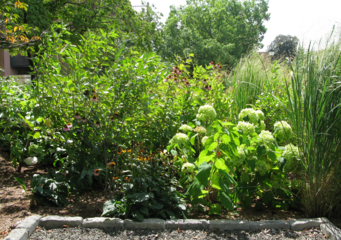
Location: 205 Prospect St, New Haven, CT 06511
Description: A rain garden that captures stormwater from the roof of Sage Hall through a disconnected downspout. It replaced an old drainage system that used to dump stormwater from the roof of Sage into the city’s sewers.
Did you know? Sage Rain Garden captures stormwater that would otherwise go through the storm sewer and into local waterbodies untreated.
- The garden promotes biodiversity through native plant species.
- It uses berms and native plants to collect and absorb rainwater.
- It was designed by two Yale F&ES students as a student project and constructed by Yale Facilities.
Get involved: Visit the rain garden and read Yale’s Sustainable Stormwater Management Plan.
Yale Community Forest Garden
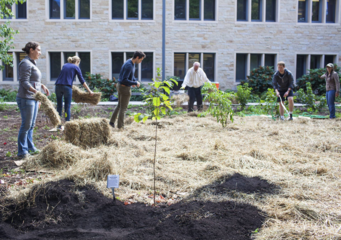
Location: North side of 195 Prospect St, New Haven, CT 06511
Description: An edible garden that is both an educational and productive space that demonstrates how thoughtful, ecological landscaping can reap huge rewards. It was started as an F&ES student project and Yale Facilities helped construct it.
Did you know? The forest garden provides wildlife and insect habitats. It harnesses flows of energy throughout the system to eventually reduce maintenance needs
- The forest garden is part of the Agroforestry Collaborative that includes the Yale Farm, the Landscape Lab, and the Yale-Myers Forest.
Get involved: Learn more about the development of the forest garden and other sustainability initiatives at the School of Forestry and Environmental Studies
Yale Experimental Watershed

Location: 5.5 acre site between Prospect and Mansfield Streets
Description: An urban watershed of great value to the University and the community. The watershed is in the Science Hill portion of Yale’s campus and hosts research and fieldwork including tree identification and mapping, bird habitat investigation, soil sampling and testing, and land cover mapping.
Did you know? The watershed provides stormwater infiltration, increased biodiversity, and educational opportunities.
- Students from Yale FES, Common Ground Green Jobs, the Yale Scholar Program, and local high schools use the site as an educational resource.
The West Campus Urban Farm
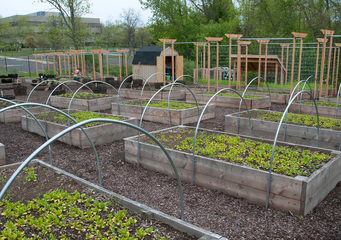
Location: 100 West Campus Drive, Orange, CT 06477; across from Building 230
Description: Part of 136 acres on West Campus created to connect scholars from across Yale for sustainability-related research and learning
Did you know? The urban farm was designed to provide a space for research, innovation, and collaboration across Yale and beyond.
- The Yale Landscape Lab uses the urban farm to pioneer new ways of teaching within the health sciences by partnering with the Schools of Medicine and Nursing.
- YLL partners with groups around campus to catalyze the creation of businesses and products at scale on campus, including the Yale Bee Space, the Wikihouse, and Poda Foods/Edible Cricket Company.
- The farm supports the use of the campus as a living subject matter with approaches to sustainable food and agriculture, invasive species research, and experimental grassland initiatives.
- Part of the Agroforestry Collaborative
Yale Farm
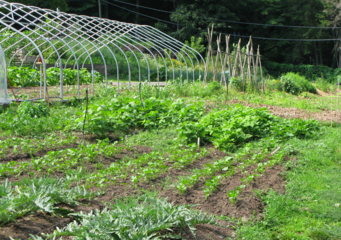
Location: 345 Edwards St, New Haven, CT 06511
Description: Academic farm that produces dozens of varieties of vegetables, fruits, herbs, and flowers, and is home to free-range laying hens and honeybees. It hosts the Yale Sustainable Food Program and offers a hands-on collaborative learning experience for students and members of the community.
Did you know? Each Friday afternoon from the start of the school year through late November and from after spring break through May, the Yale Farm serves wood-fired pizza made right on the Farm to volunteers and visitors at 4:30pm while a student does a short presentation on a food-related topic as part of the knead 2 know series.
Get involved: The Yale Farm has volunteer days for Yale affiliates and community members regularly throughout the year. You don’t need to have any farming experience – just show up for as long or short as you’d like.
Bioswales
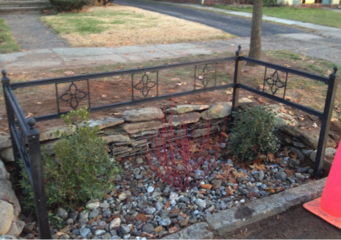
Location: 2 located on Chapel St. near the Yale University Art Gallery and Old Campus
Description: A form of green infrastructure that diverts rainwater from the sewer. New Haven is working to install 200 bioswales in downtown New Haven, approximately 50 of which will be located adjacent to Yale’s campus.
Did you know? Bioswales reduce pollution and flooding.
- Incoming students at FES helped assess locations for the placement of New Haven’s bioswales as part of their Urban MODs programming.
- The Urban Resources Initiative and the Yale Hixon Center for Urban Ecology collaborated with the City of New Haven on constructing and monitoring eight bioswales on West Park Avenue, and seven more on Daisy Street in the Newhallville neighborhood of New Haven.
Get involved: Use natural fertilizers and homemade pesticides to reduce pollution entering stormwater runoff.